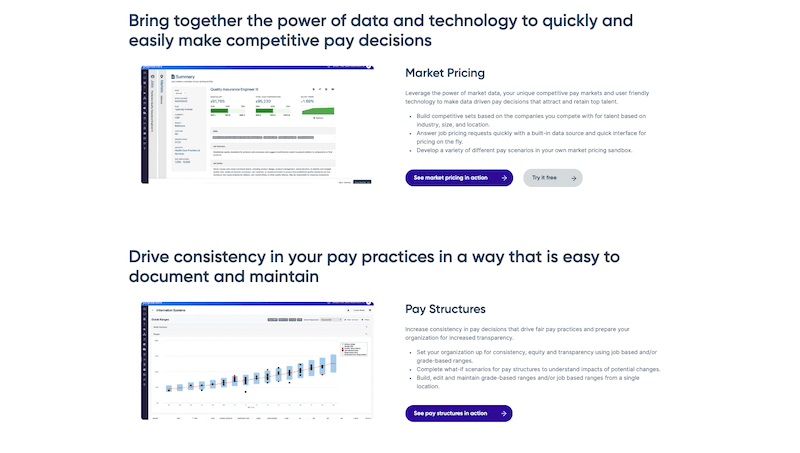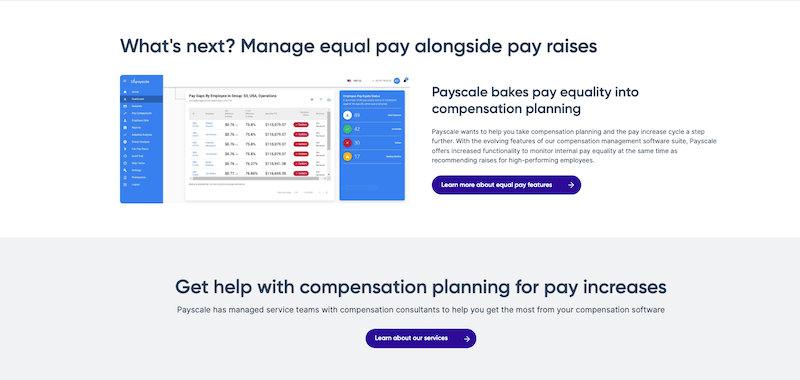Need to do some salary benchmarking? It can be hard to pin down exact costs for a salary benchmarking tool like Payscale.
But we used Payscale for a year to learn how well it works—and how much it costs. In this post, we’ll break down where the $11,000 price tag comes from. Just keep in mind that we’re a small startup, so this is the very low end of what companies should expect to pay.
At the end of this post, you’ll know whether or not Payscale is a good fit for your organization’s budget.
Payscale is Free for Job-Seekers & Employees
First, let’s clear something up: we’ll be talking about how much Payscale costs for employers.
Not employees.
Payscale doesn’t cost anything to use if you’re an employee or a job seeker. All you have to do is fill out a short survey and you’ll get a detailed compensation report for free. You can also browse jobs on Payscale’s free Salary Data & Career Research Center. This tool allows you to research jobs by company, state, school, degree, job title, and category.
So if you’re looking for a job or want to find out if your employer is paying you what you’re worth, get started on Payscale for Individuals.
This post is for employers and HR managers.
As we explore Payscale pricing in this section, keep in mind that the company offers three general plan tiers:
- Basic: Market data for pricing jobs
- Professional: Full-service pay strategy with reporting, analytics, and dedicated support
- Advanced: Sophisticated pay management with access to survey data
No prices are listed for these plan tiers. But knowing about these overarching plan levels will help you get the most out of this next section.
Payscale Cost Overview: By Product
While it’s free for jobseekers, Payscale isn’t free for employers—not by a long shot. In this section, we’ll give you an overview of each main Payscale product for employers—plus how much it costs.
Payscale offers SMBs two core tools:
- Payscale Payfactors: Software that gives organizations the tools and data needed to manage compensation and pay structures.
- Payscale Compensation Planning: Tool that helps optimize employee compensation so it aligns with your business goals and market trends.
Let’s take a look at how much these products cost based on our experience using them.
Payscale Payfactors Pricing

You can think of Payfactors as your virtual home for all things salary benchmarking. The software features several different tools for planning and tracking salaries.
There’s the Market Pricing tool, which analyzes salary data for companies you compete with and creates competitive datasets for you. It also lets you get creative. With Payfactors’ market pricing sandbox, you can put together a variety of pay scenarios and measure how well they’d work for your company.
The Pay Structures feature helps companies organize their in-house pay ranges and visualize them on a graph. Survey management, reporting, and in-depth analytics round out the Payfactors toolbox.
So how much do these features cost?
Here’s what the Payfactors sales team quoted us:
- Basic plan + 1 dataset + basic support: $6,625
- Basic plan + 2 datasets + basic support: $9,690
- Professional plan + 2 datasets + midlevel support: $10,315
- Professional plan + 2 datasets + 25 hours/year of hands-on support: $13,370
These are all annual prices. If you sign up for a three-year contract, you can get a discount.
We ended up buying the most expensive plan: the pro plan + 2 datasets + 25 hours a year of hands-on support. Even though the price quoted is $13K, we only paid about $11K after the dust settled.
But keep in mind we only needed to benchmark 16 roles. If you’re not a small startup like us and you need to benchmark 20+ roles, you’ll pay a lot more.
Was this investment worth it?
Kind of. The hands-on support was incredible, the interface was super user-friendly, and the HR-reported dataset was decently reliable. But the second dataset—the employee-reported one—wasn’t.
Learn more about our experience in our guide to the 4 best compensation planning tools.
Payscale Compensation Planning

Payscale’s compensation planning tool allows companies to develop their comp strategy, track pay equity, and update job descriptions.
With compensation planning, you can create an appealing salary offer and keep tight reins on it as an employee progresses through your company. For example, the tool helps you plan for pay raises, account for performance bonuses, and audit your overall pay equity.
All while staying within the confines of your budget.
Here’s what we loved about this tool: it’s a lot more comprehensive and detailed than its competitors. If you’re a huge company with dozens of roles and salaries to manage, you’ll find a lot of value here.
But only if you buy a Professional plan. Compensation planning isn’t included in any of the Basic plans we were quoted. So, expect to pay at least $10K for this service.
For a small company like us, the compensation planning tools were a little too powerful. We didn’t really need all the features it came with, but we 100% think a bigger organization with tons of roles would get a lot out of it.
Payscale Market Data
Let’s circle back to Payscale’s market data, which powers Payfactors and Compensation Planning.
It comes from two main sources:
- Peer data (employer reports): Includes data from vetted payrolls around the country and was as reliable as you could hope for.
- Employee reports: Self-reported, supposedly vetted, but unreliable in our experience.
Payscale refreshes its data continuously throughout the year, so odds are you’ll get information that’s up-to-date.
According to what we were quoted, it looks like extra datasets cost around $3K each. There’s about a $3K difference between pricing for 1 or 2 datasets on both the Basic and Professional plans.
We primarily relied on the peer data, which was decently reliable, despite benchmarking in general being about 10% off base. But the employee-reported dataset we paid for didn’t bring us much value. This isn’t too surprising, considering employees can report whatever they want. But we definitely don’t recommend paying an extra $3K for it.
Unfortunately, Payscale doesn’t seem to leave employers with much choice. For us, the extra dataset was bundled into our Professional plan, which we picked mainly for the hands-on support. If you can get your sales rep to drop the second dataset and the extra $3K that comes with it, do it.
How Much Does Payscale Cost Compared to Similar Tools?
Salary.com is Payscale’s direct competitor, and its CompAnalyst feature competes toe-to-toe with Payfactors. Like Payscale, Salary.com draws data from HR departments and refreshes it continuously.
When we called Salary.com for a quote, we were surprised at the low price—just $3,850 a year. When you compare that to the $11K we paid for Payscale, it seems like a steal.
But there’s a reason Salary.com is so cheap: there’s zero customer support. No guided onboarding. No help using CompAnalyst or any of Salary.com’s other tools. You’re on your own for all of that.
The good news is it’s pretty easy to use on Day 1, even if you’re not an HR expert. For startups and small businesses, the low price and ease of use are probably worth it, as long as you’re prepared to deal with some frustration.
Larger organizations will benefit more from Payscale, though. Despite the higher cost, bigger businesses will definitely see the ROI from Payscale. Especially considering the depth and breadth of its Compensation Planning tool.
Another Payscale competitor, Compease, also costs surprisingly little—we were quoted $2,500 a year for 16 seats plus $40 a year for each extra seat. This price tag also included job evaluations for 15 roles. Additional evals would cost $100 apiece.
Here’s the thing, though: Compease only updates its data once a year. That was enough of a red flag for us to avoid trying their service. So we don’t have first-hand experience on the support level there. But for the price, we wouldn’t expect the hands-on, consultant-like help we got from Payscale.
Another competitor, SalaryExpert, quoted us $3.5-7K, and that’s about as far as we got with them.
If you’re a pro and want to DIY your compensation benchmarking, you can purchase datasets and do your thing. Payscale datasets cost around $3K each but you can’t buy them à la carte. You have to pay for one of Payscale’s plans to get them.
Buying a single dataset from a salary survey company like Mercer or Culpepper costs between $1,500 to $5,700 to start. If you want something comprehensive like Mercer’s complete benchmark database, you’ll pay between $23,000 and $25,400.
There’s one more option to consider. If you don’t want the headache of managing and planning employee compensation yourself, you can hire a consultant to do the work for you. Honestly, that’s essentially what we paid for with Payscale. The level of support we received was so helpful, it was like having a consultant.
If you hire a consultant, expect to pay about $200 per job description plus $200 an hour for consulting fees. Consultants will have access to datasets, so you’ll pay for those indirectly through the consulting and job description fees.
If you’re like us—a small startup with 15 employees—that’s a few grand. Larger companies will pay more.
Need more options? See our post on Payscale competitors and alternatives for some top suggestions.




